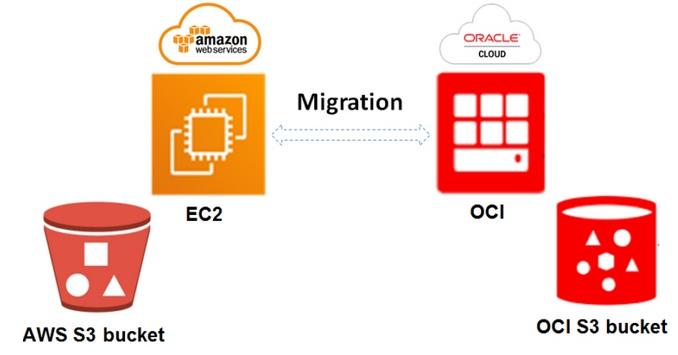In today’s data-driven world, efficient and secure data management is paramount for businesses of all sizes. The integration between Oracle, a leading database management system, and Amazon S3 (Simple Storage Service), a scalable and secure cloud storage platform, has become a game-changer for organizations looking to streamline data transfer, storage, and analysis processes. In this article, we’ll explore the benefits and strategies for Oracle to S3 integration.
Understanding Oracle and S3
Before delving into the integration process, let’s briefly understand the two key components: Oracle and S3.
Oracle Database:
Oracle is renowned for its robust and versatile relational database management system (RDBMS). It’s trusted by thousands of organizations worldwide to store, manage, and analyze their critical data. However, as data volumes continue to grow exponentially, businesses face the challenge of efficiently storing and accessing their Oracle database data.
Amazon S3:
Amazon S3 is a scalable and cost-effective object storage service offered by Amazon Web Services (AWS). It’s designed to store and retrieve data of any size with high durability and availability. S3 is an ideal solution for businesses looking to store vast amounts of data in a secure and easily accessible manner.
Benefits of Oracle to S3 Integration
Cost-Efficiency: One of the primary advantages of integrating Oracle with S3 is cost savings. Traditional on-premises data storage and management can be expensive due to hardware, maintenance, and operational costs. S3, on the other hand, follows a pay-as-you-go pricing model, allowing organizations to optimize costs based on their actual data usage.
Scalability: S3 offers virtually unlimited storage capacity. As your data requirements grow, you can seamlessly scale your storage space without the need for complex infrastructure upgrades. This scalability ensures that your organization is prepared for future data growth.
Data Accessibility: With Oracle to S3 integration, your data becomes easily accessible from anywhere with an internet connection. This accessibility is crucial for remote workforces and collaborative data analysis, enabling teams to make informed decisions faster.
Security and Durability: Amazon S3 is designed with data security in mind. It provides robust encryption options and access control features to protect your data. Additionally, S3 offers 99.999999999% (11 nines) durability, making it highly reliable for long-term data storage.
Backup and Disaster Recovery: S3 serves as an excellent backup and disaster recovery solution for Oracle databases. You can automate data backups to S3, ensuring that your critical data is safe and recoverable in the event of a disaster.
Strategies for Oracle to S3 Integration
Now that we’ve discussed the advantages, let’s explore how to implement Oracle to S3 integration effectively:
Use AWS Data Integration Services: Amazon offers a range of data integration services such as AWS DataSync and AWS Database Migration Service (DMS) that facilitate data transfer from Oracle to S3. These services provide automation and minimize the complexity of the integration process.
Data Transformation: Depending on your data requirements, you may need to transform data from your Oracle database to a format suitable for S3. Tools like AWS Glue can assist in data transformation and preparation for storage.
Scheduled Data Transfers: Implement scheduled data transfers to ensure that your S3 bucket remains up-to-date with the latest information from your Oracle database. This is especially important for real-time data analysis and reporting.
Access Control: Leverage AWS Identity and Access Management (IAM) to manage access permissions for your S3 bucket. Restrict access to authorized users and ensure data security.
Monitoring and Logging: Set up monitoring and logging using AWS CloudWatch to keep track of data transfer operations. This helps in identifying and resolving issues promptly.
Cost Optimization: Regularly review your data storage and transfer costs on AWS to optimize your expenses. AWS Cost Explorer provides valuable insights into your usage patterns.
Data Lifecycle Policies: Implement data lifecycle policies to automatically archive or delete data that is no longer needed. This helps in maintaining an organized and cost-efficient storage environment.
Enhancing Data Analytics:
In addition to the aforementioned benefits, Oracle to S3 integration significantly enhances data analytics capabilities. With data residing in Amazon S3, you can leverage powerful analytics services provided by AWS, such as Amazon Athena and Amazon Redshift, to gain valuable insights from your data.
Amazon Athena: Athena allows you to run ad-hoc SQL queries on the data stored in S3 without the need for complex data loading or transformation. This means that your data scientists and analysts can quickly explore and analyze data, uncovering hidden trends and patterns.
Amazon Redshift: For more extensive data warehousing and analysis needs, Amazon Redshift provides a data warehouse solution that seamlessly integrates with S3. It offers high-performance querying and scalable data warehousing, making it an excellent choice for organizations requiring sophisticated analytics and reporting.
Data Lakes and Data Warehousing: By integrating Oracle with S3, you effectively create a data lake that holds diverse data types, including structured and unstructured data. This versatility makes it easier to consolidate data from various sources, ensuring that your analytics efforts are comprehensive and accurate. Simultaneously, you can maintain a separate data warehouse using Amazon Redshift for structured data, providing a structured analytics environment.
Future-Proofing Your Data Strategy:
As the volume and complexity of data continue to grow, a well-planned Oracle to S3 integration strategy future-proofs your data management. This approach ensures that your organization is agile and adaptable, ready to embrace emerging technologies and analytics methodologies. It also simplifies data migrations, making it easier to transition to more advanced cloud-based solutions as your business evolves.
Oracle to S3 integration is not just about efficient data transfer and storage; it’s a strategic move that empowers your organization to excel in data analytics, reduce costs, and secure your data for the long term. Embrace this integration to unlock the full potential of your data and stay competitive in today’s data-centric business landscape.

